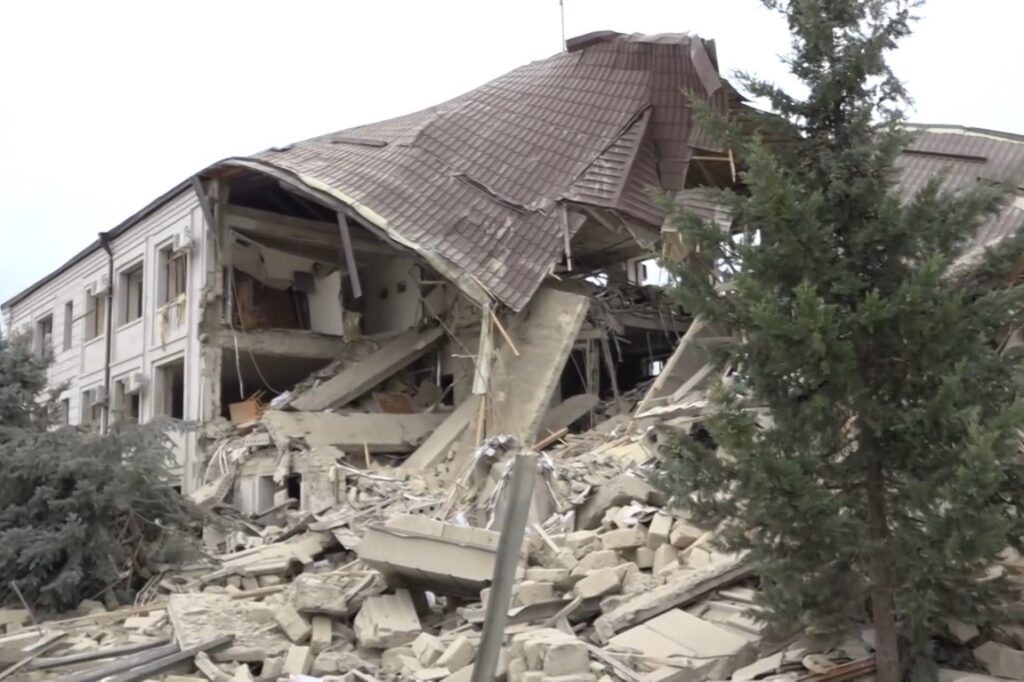Civilian settlements on both sides of the war have been under fire over the last eleven days, leading to dozens of deaths. But nowhere has sustained such an intense assault as the capital of Nagorno-Karabakh.
A video published by the BBC on 5 October shows the tearful goodbyes as a group of residents board a bus to leave Stepanakert (Khankandi). The next moment, a shell explodes nearby and everyone darts for cover.
‘A real reminder, as they were fleeing’, states BBC journalist Jonah Fisher. As why this place is increasingly dangerous for people under attack day and night.’
In the past week, as fighting over Nagorno-Karabakh exploded between Armenian and Azerbaijani forces, civilian populations on both sides have come under fire. Settlements all over Nagorno-Karabakh have been hit, as have numerous villages and towns in Azerbaijan.
At the time of writing, Azerbaijan has reported 25 civilian deaths, Armenia 21. These numbers will almost certainly rise.
Ganja, the second-largest city in Azerbaijan, has been hit by repeated rocket fire, reportedly killing civilians and sending residents of the city to shelter in basements.
But so far, no place has sustained so much concentrated fire as Stepanakert.
Subject to drone strikes, artillery barges, and as Amnesty International reports, the use of cluster munitions — day by day, the city is being reduced to rubble.
Destruction
Stepanakert (Khankandi), a city with a population of 55,000, has seen near-constant shelling by Azerbaijani forces for the past six days.
Pictures and videos published by journalists have shown the extent of the devastation. Flats with shattered windows, whole buildings caved-in, and massive craters collecting water.

For several days, the city was without electricity after an artillery strike took out the city’s power grid. Only today, has it been partially restored.
The inhabitants of Stepanakert have been seeking shelter in bunkers and evacuating children and the elderly to different cities in Armenia.
Matthew Cassel, a correspondent for VICE News, was in Stepanakert from 2 October to 5 October. ‘Despite Azerbaijan having seemingly precise military tech as shown in the videos they’ve been publishing’, he told OC Media. ‘The bombings were still indiscriminate.’
He said that while he saw damage to infrastructure, ‘such as fuel supply lines’, and on ‘unofficial bases holding security personnel’ he also witnessed civilian homes damaged that had no military infrastructure nearby.
‘It was a mix of precision strikes but also indiscriminate attacks on civilian areas.’
Memories of Beirut
Roubina Margossian, Managing Editor at Armenian news publication EVN Report, was in Stepanakert from the night of 27 September and returned to Yerevan on 4 October. She told OC Media that the first two days of the conflict were relatively calm, but the shelling grew more intense throughout the week.
Margossian, who grew up during the civil war in Lebanon in the 1970s, drew a grim contrast between the two wars.
‘In Beirut, while hiding in shelters, if we heard bombs going off we didn’t worry so much about our safety, we assumed several buildings would be damaged, a wall in a house would be cracked,’ she recalled. ‘In Stepanakert, due to the calibre of the weapons being used, we feared our shelters would not be strong enough to keep us safe.’

Cluster munitions
On 5 October, Amnesty International issued a statement condemning the use of cluster munitions in the region, specifically in Stepanakert.
‘Over the weekend, footage consistent with the use of cluster munitions in the city of Stepanakert […] was published by the region’s de facto authorities,’ the statement reads.
Amnesty International’s Deputy Director of Eastern Europe and Central Asia Denis Krivosheev has stated that the use of cluster bombs on civilians is reprehensible.
‘Cluster bombs are inherently indiscriminate weapons, and their deployment in residential areas is absolutely appalling and unacceptable,’ said Krivosheev. ‘As fighting continues to escalate, civilians must be protected, not deliberately targeted or recklessly endangered’.
Neither Armenia nor Azerbaijan are signatories to the international Convention on Cluster Munitions.
‘A civilian crisis’
The International Committee of the Red Cross also issued a statement on 5 October condemning indiscriminate shelling of civil areas.
‘Hundreds of homes and key infrastructures like hospitals and schools have been destroyed or heavily damaged by artillery fire and airborne attacks including missiles,’ their statement reads. ‘The use of explosive weapons and wide impact areas against military targets in populated areas may violate international humanitarian law, which prohibits indiscriminate and disproportionate attacks’.
Meanwhile, diplomatic efforts have borne no fruit, and despite countries all over the world, including France, Russia, and United States — and with the notable exception of Turkey — calling for a ceasefire, the fighting continues.
Speaking with AFP on 7 October, eleven days into the war, Artak Beglaryan, Nagorno-Karabakh’s Human Rights Defender said that as of that roughly half of the population of the region has been displaced.
Matthew Cassel said that he believes the situation in Stepanakert is dire.
‘Refugees are coming into Armenia,’ he said. ‘These people left with very little thinking they will be gone for a short period of time, however, experience shows that they might not be able to go back immediately.’
‘A civilian crisis is already happening’, he concluded.
For ease of reading, we choose not to use qualifiers such as ‘de facto’, ‘unrecognised’, or ‘partially recognised’ when discussing institutions or political positions within Abkhazia, Nagorno-Karabakh, and South Ossetia. This does not imply a position on their status.




 7 October 2020
7 October 2020



